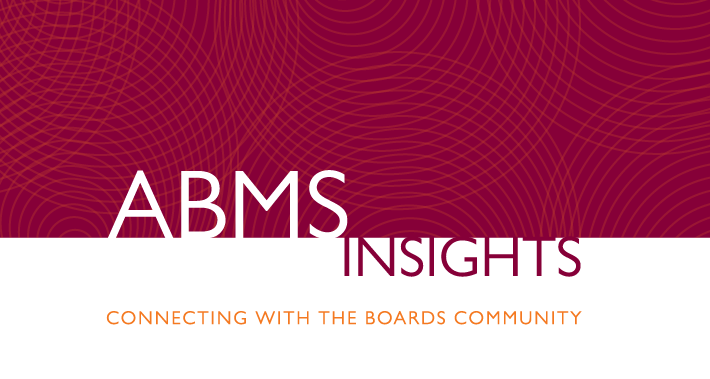
You’ve seen the headlines: Continuing certification is linked to better patient care. Board certified physicians are less likely to face disciplinary actions.

What you don’t see are the teams of researchers at the American Board of Medical Specialties (ABMS) Member Boards behind some of those headlines. These physician investigators, psychometricians, and data analysts, among other experts, conduct research that supports their Member Boards’ mission. What are they looking for? They regularly evaluate their board’s certification programs to ensure they accurately measure physician knowledge, to examine their programs’ links to better care, to check they are fair and equitable across different groups, to better understand the relationship of certification to graduate medical education training, and to determine ways to improve the programs that will better support physicians and medical specialists.
While many Member Boards have been conducting this type of research for a decade or more, others have more recently expanded their efforts. Some boards have a standing Research Committee, which typically reports to the Board of Directors (BOD) and guides research activities, recommends related policies, and monitors ongoing projects. Other boards have a Research and/or Psychometrics Department, or a combination of the two, whose staff conducts or oversees much of the research. Many boards have both a committee and department, which range in size from four to 10 members. Other research-oriented responsibilities include reviewing data requests from external researchers, and working with visiting scholars, including ABMS Visiting Scholars for the 11 boards that sponsor them.
Research Spans Decades
The American Board of Family Medicine (ABFM) has had a Research and Development Committee of the BOD for more than 20 years. ABFM began conducting formal research activities in 2008 by contracting with the American Academy of Family Physicians (AAFP) Robert Graham Center for Policy Research (RGC). ABFM continues closely coordinated research and data exchange efforts with RGC today, leading to a host of independent and joint publications, presentations, and projects. Recently, ABFM and RGC teams have explored and advanced work on health equity issues such as race and gender physician pay gaps, language concordant care, addressing social determinants of health in primary care, and Sustaining Women in Medicine.
In 2012, ABFM created an in-house Research Department whose staff focuses on five key areas of research. ABFM also works with the AAFP Practice Advancement segment to improve Measures That Matter for Primary Care, and its Medical Education division to better understand trends in family medicine education, and their impacts on downstream outcomes. ABFM accepts proposals to collaborate on research projects with outside organizations, mainly with a focus on Family Medicine Certification and health care quality.
In the broader context, ABFM’s research enterprise includes a policy and research center team at the Center for Professionalism & Value in Health Care and the Prime Registry team. Research endeavors are also enriched and extended by a Visiting Scholars Program, Health Policy Fellowship, and series of internships. Since 2012, the ABFM research team has published more than 400 articles.
The American Board of Internal Medicine (ABIM) has had a Research Department for approximately 10 years. Department staff have done extensive original research and psychometric analysis as well as teamed up with several external collaborative researchers. ABIM’s research strategy focuses on three domains, which are:
- Foundational Science: To describe the theoretical framework behind why routine assessment of medical knowledge is potentially important for patient care and continuous professional development.
- Effectiveness Research: To perform research on the effectiveness/value of certification and continuing certification assessment programs for physicians in internal medicine and its subspecialties with the ultimate goal of determining if the health of patients cared for by board certified physicians is enhanced.
- Public Awareness Research: To perform research on public awareness for patients with respect to their understanding of certification and for all stakeholders on the research and theoretical underpinnings of why consequential certification is important.
Since 2000, ABIM staff and leadership have published more than 300 articles on these topics. A recently published study linked high scores for newly trained internists on the ABIM board certification examination to fewer patient deaths and hospital readmissions. Some of ABIM’s research that links certification to better patient care has been turned into easy to understand infographics.
The American Board of Pediatrics (ABP) has supported research dating back to 1999. Much of the research is conducted by external research centers in conjunction with senior staff in ABP’s Assessment and Research departments. Currently, the ABP Foundation (ABPF) BOD provide oversight to the research and evaluations funded by ABPF. Research topics include health care delivery trends and their impact, parent and public perceptions, pediatric workforce trends, and behavioral/mental health. In recent years, ABPF supported projects that led to the initial development of Accreditation Council for Graduate Medical Education pediatrics milestones and entrustable professional activities as tools for competency-based medical education. To date, ABP has published approximately 270 research papers, reports, and commentaries in peer-reviewed journals.
Research Capabilities Grow
The American Board of Surgery (ABS) has had a longstanding track record of conducting research. In 2019, ABS established a Research Committee as a standing committee within its governance structure. ABS conducts staff-led research projects and collaborates with many external researchers, helping to support nearly 200 publications. Current research priorities address training and maintaining a diverse workforce capable of caring for a diverse society; the value of ABS certification; evaluation of the ABS Continuous Certification Program across a variety of metrics; residency training; the relationship between quality improvement activities and clinical outcomes and patient experience; and psychometric processes for setting optimal exam standards.
The American Board of Obstetrics and Gynecology (ABOG) has had a Psychometrics and Research Department for years but established a Research Committee in 2022 to assist in reviewing research results, planning for research and innovation activities, and reviewing external research requests. ABOG conducts research both internally and collaboratively with external partners. Among ABOG’s strategic priorities for research are psychometrics and defensibility of its assessments; the relevance and/or value of initial certification; impact of the board’s diversity, equity, and inclusion initiatives; the relevance and/or value of continuing certification; pipeline to certification (residency and fellowship training) practice patterns of certified obstetrician/gynecologists; and outcomes-based research.
Although the American Board of Emergency Medicine (ABEM) has had a Research Committee for many years, two years ago the board established a Division of Research and hired its first Director of Research. This role is responsible for developing and growing the board’s research portfolio. ABEM research initiatives include analyses of certification programs, the specialty, and assessment and educational outcomes. To date, ABEM researchers have contributed nearly 120 related articles.
Similarly, the American Board of Anesthesiology (ABA) has a standing Research Committee and internal team that conducts research initiatives, and in 2023 the board hired a Physician Research Consultant to help support their efforts. The role was designed to conceptualize, design, and execute studies; identify and generate relevant data; direct analyses; and participate in developing manuscripts for publication. In addition to validating its assessment programs, ABA explores resident experiences, career decisions, anesthesiologist workforce, and physician well-being. Current projects include research related to Accreditation Council for Graduate Medical Education milestones; competency-based medical education; diversity, equity, and inclusion; and novel assessment methodologies. ABA also co-sponsors a Research in Education Grant with the Foundation for Anesthesia Education and Research, prioritizing projects that evaluate elements of board certification for anesthesiologists.
Two years ago, the American Board of Ophthalmology established a formal Research Committee. ABO supports research that evaluates the effectiveness of its programs and activities; examines the relationships between certification and physician education, clinical practice, and career-long improvement; contributes meaningfully to the literature about physician competence; and promotes psychometric equity, excellence, and fairness. Current projects involve evaluating the relationship between in-training exam scores and initial certification exam scores as well as supporting its ABMS Visiting Scholars’ research related to diversity in the ABO’s volunteer pool and evaluating improvement in medical practice activity options.
In 2023, the American Board of Dermatology (ABD) hired a Director of Research and Continuous Improvement to coordinate the ABD’s research agenda, pursue data-driven projects to address these areas, coordinate peer-reviewed research originating from ABD, and mentor the ABD-sponsored ABMS Visiting Scholar. Current projects include reporting outcomes from the first eight years of the Focused Practice Improvement program and assisting an ABMS Visiting Scholar on research about performance on the ABD Basic Exam.
Member Boards, such as the American Board of Pathology, conduct research without a formal committee or department. The topics are determined based on evolving issues of interest and importance to the Board of Trustees and the Chief Executive Officer. The work is completed by staff members with other roles, including the Chief Executive Officer and Trustees. Papers have focused on optimal timing for primary certification, competency-based assessment development, success rates of specific items on the ABPath CertLink assessment, and a recent review of the impact of the pandemic in producing an unprecedented low pass rate on the 2022 Blood Banking/Transfusion Medicine examination.
A robust research agenda is essential to ensure that certification programs are doing what they were designed to do while providing optimal support for physicians and specialists to better serve their patients and communities.
© 2024, American Board of Medical Specialties.
-
Read More:
- ABMS Insights |
